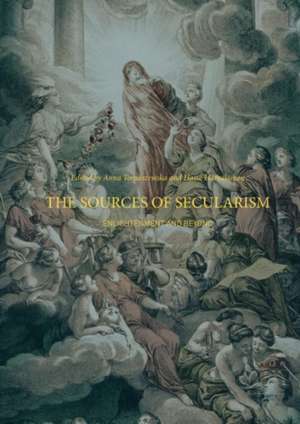The Sources of Secularism: Enlightenment and Beyond
Editat de Anna Tomaszewska, Hasse Hämäläinenen Limba Engleză Hardback – 19 oct 2017
| Toate formatele și edițiile | Preț | Express |
|---|---|---|
| Paperback (1) | 528.43 lei 38-44 zile | |
| Springer International Publishing – 15 aug 2018 | 528.43 lei 38-44 zile | |
| Hardback (1) | 786.04 lei 6-8 săpt. | |
| Springer International Publishing – 19 oct 2017 | 786.04 lei 6-8 săpt. |
Preț: 786.04 lei
Preț vechi: 958.59 lei
-18% Nou
Puncte Express: 1179
Preț estimativ în valută:
150.43€ • 156.64$ • 127.13£
150.43€ • 156.64$ • 127.13£
Carte tipărită la comandă
Livrare economică 10-24 martie
Preluare comenzi: 021 569.72.76
Specificații
ISBN-13: 9783319653938
ISBN-10: 3319653938
Pagini: 323
Ilustrații: XIII, 323 p.
Dimensiuni: 148 x 210 mm
Greutate: 0.56 kg
Ediția:1st ed. 2017
Editura: Springer International Publishing
Colecția Palgrave Macmillan
Locul publicării:Cham, Switzerland
ISBN-10: 3319653938
Pagini: 323
Ilustrații: XIII, 323 p.
Dimensiuni: 148 x 210 mm
Greutate: 0.56 kg
Ediția:1st ed. 2017
Editura: Springer International Publishing
Colecția Palgrave Macmillan
Locul publicării:Cham, Switzerland
Cuprins
1. Editor’s Introduction.- 2. Towards a Political Theory of Secularism.- 3. The Idea of Immanence in Charles Taylor’s Philosophy of Religion.- 4. The Rationality of Secularization.-5. The Secularism of Spinoza and his Circle.- 6. Thomas Hobbes and the Secularization of Authority.- 7. The History and Philosophy of English Freethinking.- 8. Sources of Knowledge, Sources of Doubts: The Emergence of Modern Religious Studies and The French Enlightenment.- 9. The Interlacing of Secular Implications and Sacred Discourse in the French Enlightenment: Toleration and Freedom of Expression in the Works of Abbé Claude Yvon.- 10. Kant on Freedom of Thought.- 11. The Divine Immanence, Kant’s Religious Rationalism, and Spinoza.- 12. Talking to Ourselves: An Investigation into the Christian Ethics Inherent in Secularism.- 13. Rethinking Secularism as A Political Principle in the Middle East: From Negative to Positive Understanding and Perception of Secularism.
Notă biografică
Anna Tomaszewska is an assistant professor of philosophy at the Institute of Philosophy, Jagiellonian University in Kraków, Poland.
Hasse Hämäläinen is a postdoctoral researcher in the project The Enlightenment Ideas of Freedom of Thought and Conscience, and Contemporary Secularism at the Jagiellonian University in Kraków, Poland.
Hasse Hämäläinen is a postdoctoral researcher in the project The Enlightenment Ideas of Freedom of Thought and Conscience, and Contemporary Secularism at the Jagiellonian University in Kraków, Poland.
Textul de pe ultima copertă
This book examines the importance of the Enlightenment for understanding the secular outlook of contemporary Western societies. It shows the new ways of thinking about religion that emerged during the 17th and 18th centuries and have had a great impact on how we address problems related to religion in the public sphere today. Based on the assumption that political concepts are rooted in historical realities, this collection combines the perspective of political philosophy with the perspective of the history of ideas. Does secularism imply that individuals are not free to manifest their beliefs in public? Is secularization the same as rejecting faith in the absolute? Can there be a universal rational core in every religion? Does freedom of expression always go hand in hand with freedom of conscience? Is secularism an invention of the predominantly Christian West, which cannot be applied in other contexts, specifically that of Muslim cultures? Answers to these and related questions are sought not only in current theories and debates in political philosophy, but also in the writings of Immanuel Kant, Benedict Spinoza, Thomas Hobbes, Anthony Collins, Adriaan Koerbagh, Abbé Claude Yvon, Giovanni Paolo Marana, and others.
Caracteristici
Provides a wide historical as well as cross-cultural perspective on recent debates about secularism Offers a re-conception of the sources and impact of the secularization process Establishes new connections between historical events and figures that shaped the modern ways of thinking about religion Includes supplementary material: sn.pub/extras
